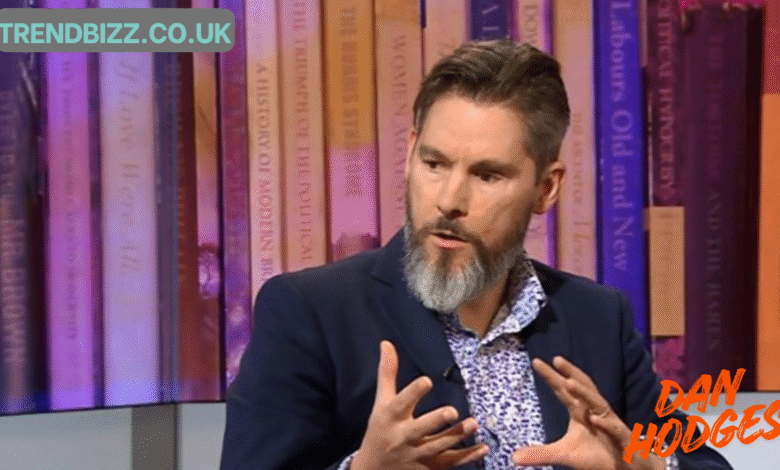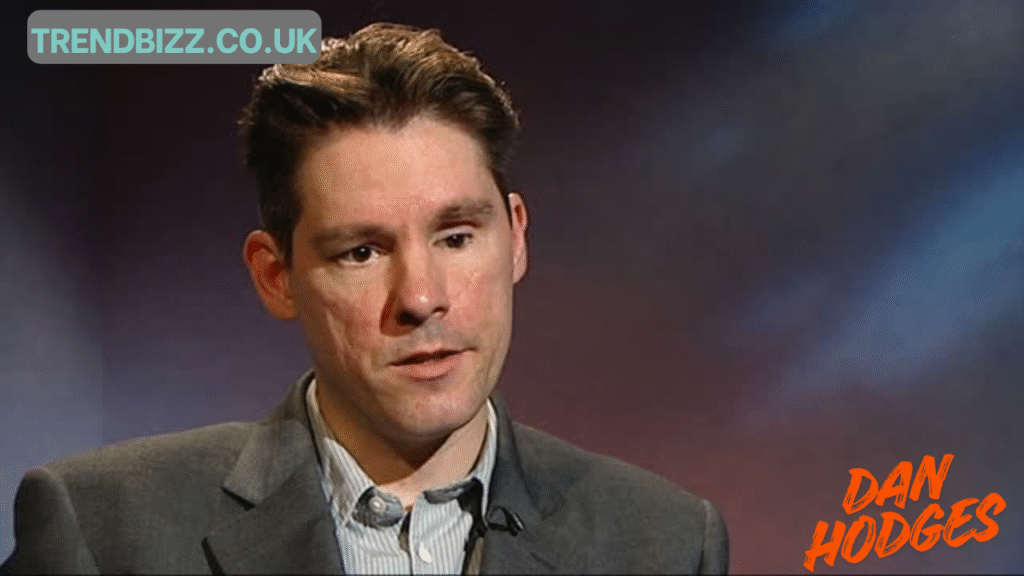Dan Hodges: The Voice of Political Commentary and Modern Journalism

Introduction
Dan Hodges is a name that resonates across the world of British journalism and political commentary. Known for his sharp insights, fearless opinions, and balanced approach to politics, Dan Hodges has established himself as one of the most influential voices in modern media. His work often bridges the gap between traditional reporting and thought-provoking analysis, offering readers a clearer understanding of political dynamics and current affairs.
This article takes a detailed look at Dan Hodges’ life, his background, career evolution, and the impact he has made in British media and political discussion.
Early Life and Background

Dan Hodges was born into a family deeply connected to British politics and the arts. His mother, Glenda Jackson, is a renowned actress and former Member of Parliament, which meant politics was always a part of his environment growing up. This upbringing provided Dan with an early understanding of political systems, leadership, and public service.
He grew up in London, surrounded by both intellectual discussions and creative influences. This combination shaped his worldview, giving him a unique perspective on the intersection of politics, society, and media.
Education and Formative Years
Dan Hodges pursued his education with a focus on social sciences and communication. His academic experiences helped him refine his ability to interpret political movements and understand the motivations behind policymaking. During his early years, Hodges developed a deep interest in political journalism, believing that media plays a key role in shaping public opinion and democratic accountability.
His early exposure to both politics and journalism set the foundation for his future career — one that would blend analysis, critique, and communication into a powerful voice for political understanding.
The Start of a Promising Career
Before rising to prominence as a columnist and commentator, Dan Hodges worked in various political and communications roles. He gained firsthand experience in political campaigns, media strategy, and government communications. These early professional experiences helped him grasp the practical realities of politics beyond theory — giving him insights that many commentators lack.
Eventually, Hodges transitioned fully into journalism, where he could merge his communication skills with his political expertise. His writing soon gained attention for its clarity, honesty, and willingness to challenge both the left and right sides of the political spectrum.
Rise in Political Journalism
Dan Hodges’ reputation as a journalist began to grow when he started writing for major British newspapers and media outlets. His work with The Telegraph, The Mail on Sunday, and other prominent publications showcased his ability to dissect complex political events with accuracy and flair.
He became known for his unapologetically direct tone — often taking bold stances on controversial issues while maintaining factual integrity. His articles not only informed readers but also sparked national discussions, making him a significant figure in British political media.
Writing Style and Influence
What sets Dan Hodges apart from many commentators is his writing style — sharp, analytical, and grounded in real-world understanding. He writes not merely to report events but to interpret them, giving readers a comprehensive view of political trends and motivations.
His columns often address themes such as government policy, election strategy, media influence, and the shifting ideologies within UK politics. Hodges also uses social media platforms, particularly Twitter, to share his views directly with the public, making him one of the more interactive voices in journalism today.

Major Contributions to British Political Thought
Throughout his career, Dan Hodges has made significant contributions to political journalism. His analysis during key political events — including elections, leadership contests, and national debates — has often been cited for its accuracy and depth.
He has also written extensively about the Labour Party, Brexit, and the evolution of political communication in the digital age. His insights help readers understand not just what is happening in politics, but why it’s happening and what it means for the country’s future.
Personal Views and Ideology
Dan Hodges identifies as a centrist commentator, often expressing frustration with political extremism on both sides. While he has roots in the Labour movement, he has frequently criticized the party’s direction when he believes it has strayed from pragmatic politics.
This balanced, sometimes contrarian stance has earned him both admiration and criticism — but above all, it has reinforced his reputation as an independent thinker. His commitment to truth over partisanship reflects his belief that journalism’s ultimate duty is to inform the public, not to serve political interests.
Media Presence and Public Engagement
Beyond his newspaper columns, Dan Hodges has made numerous television and radio appearances, participating in political debates and panel discussions. His articulate delivery and ability to simplify complex topics make him a respected presence in broadcast journalism.
He engages actively with his audience, discussing current affairs and responding to feedback with humor and insight. This accessibility has helped him maintain credibility in an era where trust in media is often questioned.
Challenges and Controversies
Like many outspoken journalists, Dan Hodges has faced his share of controversies. His candid views sometimes attract criticism from both political supporters and opponents. However, he has consistently maintained that disagreement is essential to democracy — and that open debate strengthens rather than weakens society.
Despite occasional backlash, Hodges remains steadfast in his approach, demonstrating that journalism must prioritize integrity and fearless commentary over popularity.
Legacy in Modern Journalism
Dan Hodges’ legacy in British journalism is defined by his courage to speak truthfully, his ability to analyze deeply, and his commitment to fairness. His body of work continues to influence journalists, politicians, and readers who seek nuanced perspectives in an age of polarization.
He represents a generation of writers who see political commentary not just as reporting, but as a public service — a way to hold power accountable while encouraging thoughtful discussion.
Personal Life

Outside of his professional commitments, Dan Hodges leads a private life, valuing family, reflection, and balance. While he occasionally shares glimpses of his personal experiences, he prefers to let his work speak for itself. His grounded approach to both career and life reflects his belief in authenticity — a quality that resonates with his readers.
Lessons from Dan Hodges’ Career
Dan Hodges’ journey offers several lessons for aspiring journalists and commentators:
- Integrity Over Popularity: True journalism is about truth, not trends.
- Balance and Fairness: Understanding multiple perspectives builds credibility.
- Courage to Challenge: Great commentary often involves uncomfortable truths.
- Consistency Matters: Maintaining ethical standards builds long-term respect.
- Adaptability: In a fast-changing media world, learning and evolving are essential.
These principles are what make Dan Hodges not just a journalist, but a respected thought leader in British politics.
Conclusion
Dan Hodges’ career stands as a model of what modern journalism can achieve when grounded in integrity, intellect, and courage. From his early life surrounded by politics to his rise as one of Britain’s leading political voices, his journey illustrates the power of ideas and the importance of independent thought.
As media continues to evolve, voices like Dan Hodges remain crucial — not only for informing the public but for reminding society that critical thinking and open debate are the foundations of democracy.
Also Read : Andy Murray Net Worth Complete Biography and Wealth Breakdown




